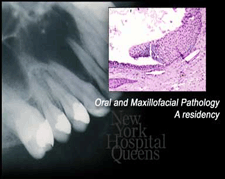المقالات
Periapical Abscess

A periapical abscess is an infection at the base or root end of the tooth (called the apex), and usually encompasses the bottom 1/3 of the tooth root. The abscess is a collection of pus that develops in response to a bacterial infection within the center of the tooth (the pulp). The source of this original infection can be either an untreated cavity, or a broken or fractured tooth. Both create an opening in the enamel, which allows bacteria into the tooth's pulp. This openingmay occur either on the crown portion of the tooth or along the root's surface. It's through this opening that bacteria enter the tooth's pulp, causing the infection.
Acute abscesses may also form as a result of other conditions in the root tip area, such as a dental granuloma or a radicular cyst. The original source of these problems is again an infection in the dental pulp. In addition to pus formation, an abscess can also cause a great deal of pain, especially when you chew or otherwise apply pressure to the infected tooth. A fever and swollen lymph nodes in the neck may also develop as your body attempts to fight off the infection. Periapical abscesses often drain on their own through openings called fistuloustracts (or gum boils).
We are usually able to restore health to an area affected with a periapical abscess.
* We may need to remove the infected portions of the tooth pulp by performing root canal therapy. This creates immediate drainage of
the infection and will usually alleviate the most severe symptoms.
* We may prescribe antibiotics to fight the infection.
* To relieve pain you can rinse with warm salt water. Dissolve one teaspoon of salt in one cup of warm water, and gently swish and spit.
* If root canal therapy or other treatments cannot remove the infection the affected tooth may need to be extracted (removed).
If the abscess is not treated, it may result in widespread infection in the surrounding soft tissue, the jaw bone, or elsewhere in the body, creating a much more serious infection. You may experience a periapical abscesses in the acute phase (described above), or you may have a low-grade, ongoing (chronic) infection with minimal symptoms. However, until the source of the infection is treated, periapical abscesses - either acute or chronic - will persist for an indefinite period of time.
